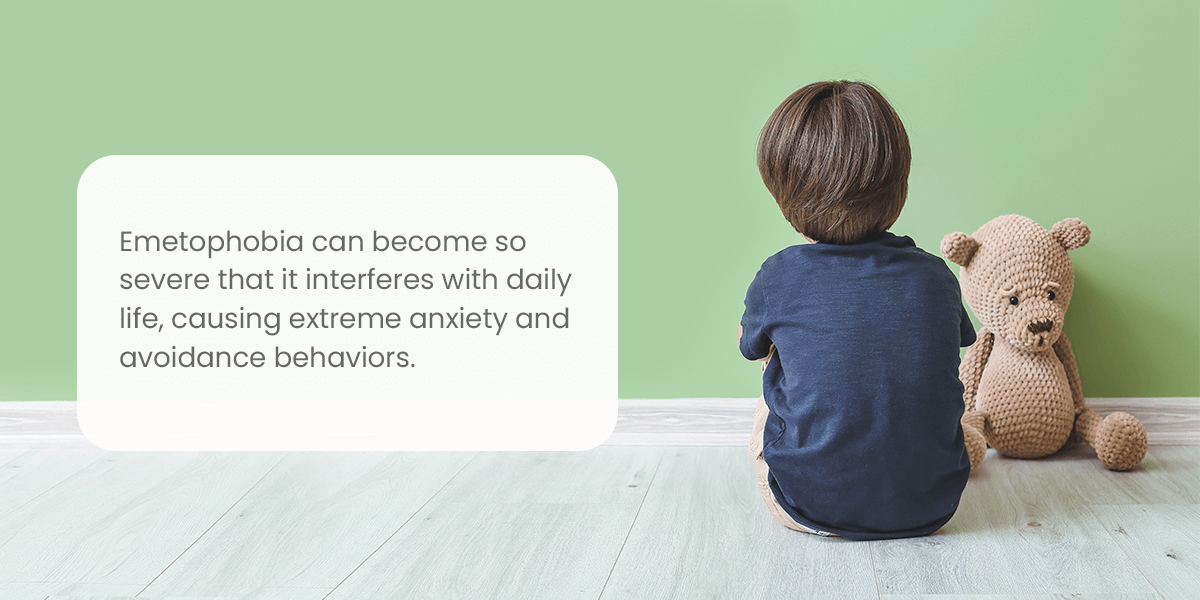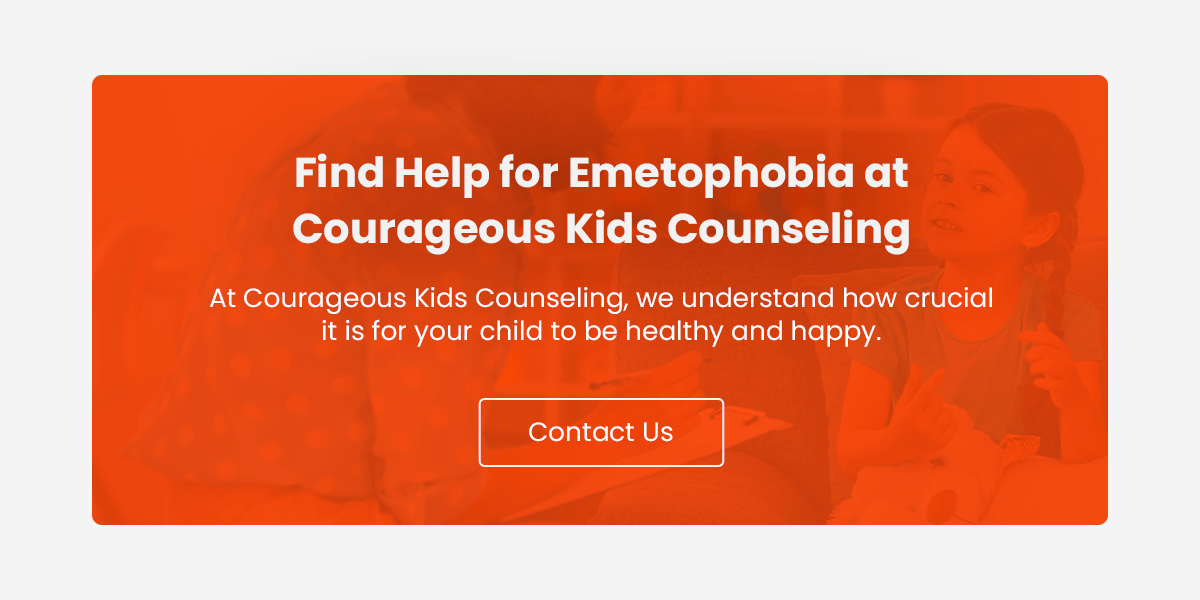If you or your child struggles with a deep-seated fear of vomiting, educating yourself on the condition can be a helpful first step in overcoming it or supporting a loved one as they navigate treatment. Many people of all ages have dealt with this intrusive disorder, so rest assured there is hope for moving past it. Read on to learn more about emetophobia, including symptoms, triggers and treatment options.
Table of Contents
Understanding What Emetophobia Is
Emetophobia is an intense fear of throwing up or seeing others throw up. It’s an anxiety disorder that may occur alongside other mental health conditions, such as generalized anxiety disorder. Those with emetophobia experience extreme distress in the presence of vomit and often fear the anticipation of vomiting itself and of puke. They may take great care to avoid situations that could result in vomiting, such as drinking alcohol, eating, taking public transit or flying. Unfortunately, avoiding things that trigger fear exacerbates the phobia and prolongs the problem.
Emetophobia can also include subcategories, depending on what causes the panic. In addition to being afraid of vomiting or seeing others do so, those with emetophobia may be fear the following:
- Being unable to get to a bathroom in time
- Vomiting repeatedly and helplessly
- Choking on vomit and suffering physical health issues
- Embarrassing themselves in front of others
- Having to visit a hospital
Emetophobia commonly begins in childhood, though it can appear at any age. If you worry your child may have emetophobia, consider the following signs and behaviors common with this phobia:
- Eating restrictively, such as avoiding foods associated with vomiting, only eating at home or eating very little
- Compulsively checking food expiration dates
- Avoiding touching surfaces so as not to come in contact with germs
- Staying away from sick people or potentially contagious environments
- Not wanting to go to school, work, friends’ houses and other public or social situations
- Washing hands excessively
- Finding and staying close to a bathroom when away from home
- Avoiding travel or crowded public places
- Having health anxiety or a preoccupation with illness
What Are the Symptoms of Emetophobia?
Characterized by an intense and irrational fear of throwing up and puking, emetophobia can become so severe that it interferes with daily life, causing extreme anxiety and avoidance behaviors. Emetophobia symptoms can vary from person to person, but some of the most common include the following:
- Avoiding situations where they might vomit in public, such as transportation, restaurants or parties
- Excessive hand-washing or cleaning to prevent the spread of germs that could cause vomiting
- Physical symptoms of anxiety, such as sweating, trembling or heart palpitations
- Panic attacks or severe anxiety when faced with the possibility of vomiting
- Obsessive thoughts about vomiting or being exposed to vomit
- Difficulty eating or maintaining a healthy weight due to fear of vomiting
Emetophobia and its symptoms can be debilitating, significantly impacting a person’s quality of life. However, seeking professional help can be an effective way to manage emetophobia symptoms.

What Triggers Emetophobia?
While health care professionals are unsure of emetophobia’s exact cause, several factors can contribute to its development.
- A frightening or distressing experience involving vomiting: One of the primary triggers of emetophobia is trauma involving vomiting or seeing someone else throw up, whether the emetophobic experienced something upsetting firsthand or witnessed a family member or friend becoming ill.
- A fear of losing control: Those who struggle with anxiety or other mental health issues may be more prone to developing emetophobia because they are afraid of being powerless over their bodies.
- Cultural attitudes toward vomiting: Social norms about vomiting can also contribute to the development of emetophobia. Some cultures see vomiting as a routine bodily function, while others view it as shameful or embarrassing. These attitudes can lead to guilt or shame for those who struggle with emetophobia.
- Genetics: Genetics may also play a role in the development of emetophobia. Research has shown that phobias may run in families, suggesting there may be a hereditary component to the disorder.
Emetophobia is a complex disorder with various triggering factors. Understanding these triggers is an essential step in managing the disorder’s symptoms and seeking effective treatment.
What Are the Treatment Options for Emetophobia?
Emetophobia can be incredibly limiting for those who struggle with it. However, it’s possible to overcome this condition and regain control over life with the proper approach. Doctors and counselors work together to provide the following emetophobia treatments.
- Cognitive behavioral therapy: CBT is one of the most effective ways to manage emetophobia. This type of therapy focuses on changing negative thought patterns and behaviors associated with the fear of vomiting. In CBT, people with emetophobia will work with a therapist to identify triggers, challenge irrational thoughts and learn coping skills to manage anxiety.
- Exposure therapy: Exposure therapy is another effective treatment for emetophobia. This approach involves gradually exposing someone to situations that trigger the fear of vomiting while learning relaxation techniques to manage anxiety. Over time, exposure helps desensitize the person to the fear and can reduce their symptoms.
- Medication: Medication can also help manage emetophobia symptoms. Antidepressants and anti-anxiety medications can help reduce anxiety and improve mood, making it easier to cope with the fear of vomiting.
- Self-care techniques: Self-care measures such as mindfulness, exercise and healthy sleep habits can help those with emetophobia manage anxieties and improve their overall mental health.
Overcoming emetophobia is a process that requires patience and commitment. Seeking treatment can be challenging, and it may take time to find the best method. With proven therapies and a robust support system, overcoming this debilitating disorder and living a happy and fulfilling life is possible.
Find Help for Emetophobia at Courageous Kids Counseling
At Courageous Kids Counseling, we understand how crucial it is for your child to be healthy and happy. We provide family and child therapy to people all over New York, specifically focusing on depression and anxiety. Through individualized therapy sessions, our counselors will help your child learn how to not be scared of throwing up.
Contact Courageous Kids Counseling today to help your child find joy and reach new heights. Learn more about how our therapeutic approach can help your child manage anxiety and overcome emetophobia, and schedule an appointment with one of our qualified clinicians. We look forward to seeing you virtually or in person at our Nyack office!



